#joanna russ
Text

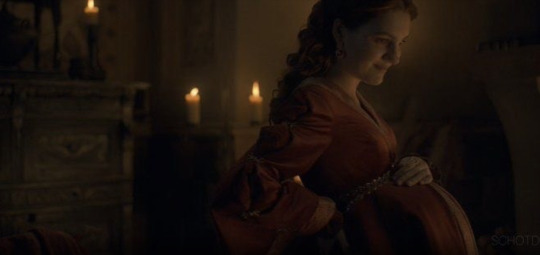

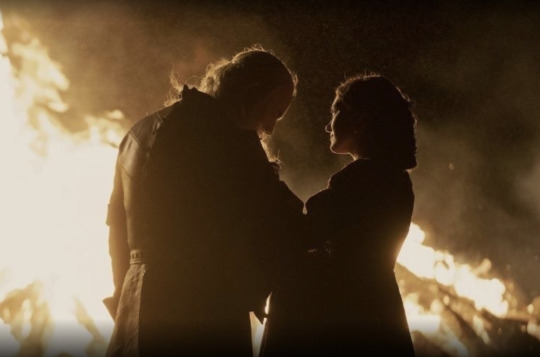



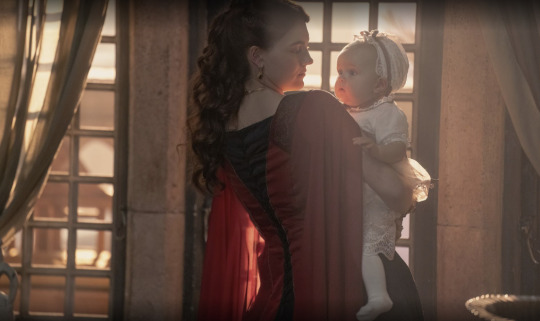
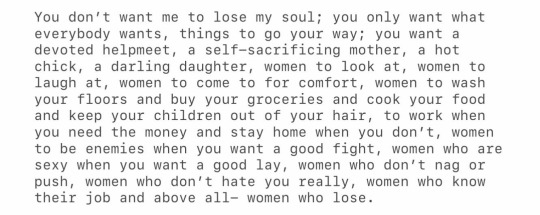
‘You seem to be enjoying the fruits of my labour that came to me too young’ - Paris Paloma, The Fruits.
Alicent Hightower and Viserys Targaryen, House of the Dragon // Hozier, Swan Upon Leda // Margaret Atwood, The Handmaid’s Tale // Paris Paloma, Labour // Joanna Russ, The Female Man
#I’m in my feelings#through his child bride he finally gets what he wants#with absolutely no regard to her personhood#just as he had always done#web weaving#mine#alicent hightower#viserys targaryen#house of the dragon#margaret atwood#the handmaids tale#paris paloma#labour#Hozier#Swan upon Leda#Joanna Russ#the female man#girlhood#womanhood
477 notes
·
View notes
Text
"I once asked a young dissertation writer whether her suddenly grayed hair was due to ill health or personal tragedy; she answered: “It was the footnotes."
-Joanna Russ, How to Suppress Women's Writing
#dark acadamia aesthetic#dark academia#light academia#light acadamia aesthetic#classic academia#quotes#romantic aesthetic#book quotes#poetry#books & libraries#academia moodboard#art academia#academia#chaotic academic aesthetic#dark academia aesthetic#dark academia books#dark academia moodboard#light academia moodboard#nature academia#chaotic academia#romanticism#dark romanticism#writer academia#writer aesthetic#writer problems#writers on tumblr#joanna russ
66 notes
·
View notes
Text
I’m reading a 1985 Joanna Russ essay on Kirk/Spock fanfiction because, you know, midrash paratext etc, and this shit goes so hard:
But that's not all that's in the material. In many ways the K/S world is a great advance over the standard romances. For one thing, there is explicit sexuality instead of the old Romances' one-kiss-in the-moonlight. And I believe Lamb and Veith see rightly when they describe the androgyny of the relationship, the impossibility (despite the coding into the Spock character of so many female traits) of assigning gender roles to either partner, ever—obviously this is very different from the romances, in which a woman's problems in life are solved for her by a dominant male. The K/S insistence that the characters be first-class human beings is inevitably compromised by the social necessity of awarding that V.I.P. status only to men.
To me one important conclusion we can draw from these stories is that sexual fantasy can't be taken at face value. Another is that no sexual cues are morally privileged (though some kinds of sexual behavior certainly are) since sexualizing any kind of behavior drastically changes the meaning of that behavior. Translated into real life, the "hurt-comfort" theme of K/S would simply be pernicious, from the woman who can do sex only under the guise of pity, to the lover who wants to keep her beloved dependent and powerless, in which condition she can then "love" the beloved. What excites in fantasy is both far more exaggerated than real life and not the same as in real life; that is, fantasy isn't just a vicarious substitute for real experience; its meaning as experience becomes changed when it's made into fantasy. Without understanding the rather complicated context of the fantasy, one "reads" it literally—like the woman friend of mine (new to Star Trek) who said in disgust that K/S was about rape and power games. This is simply not true in terms of the genre. In fact, the story that evoked this response is a classic K/S tale in which Spock goes into pon farr again after pages and pages of agonized misunderstandings, thus (thank goodness!) providing a way for the lovers finally to declare themselves and make out like crazy.
What seems to be happening in sexual fantasy is that any condition imposed on or learned with sexuality is capable of becoming sexualized, either as sex or a substitute for sex or as an indispensable condition of it. Such a process is certainly at work in the K/S universe. Yet it's perfectly clear to me that K/S writers and readers don't literally wish to become male any more than they literally want their dear ones to bleed and die in their arms or to die with their lovers. What they do want is sexual intensity, sexual enjoyment, the freedom to choose, a love that is entirely free of the culture's whole discourse of gender and sex roles, and a situation in which it is safe to let go and allow oneself to become emotionally and sexually vulnerable. The literal conditions and cues of the K/S world, far from being impeccably moral, are sexualizations of situations and behavior K/S fans did not choose and quite likely wouldn't want in reality. Moreover they are situations and behavior that are absolutely antithetical to getting sexual and emotional satistaction in the real world, which fact at least some of the K/S readers and writers know perfectly well.
56 notes
·
View notes
Text
Honoring Our Foresmutters: Joanna Russ
Inspired to post today by the recent New York Times article on Joanna Russ, “Joanna Russ Showed Us the Future: Female, Queer but Far From Perfect,” which promotes an exciting new collection of her work by the Library of America. Joanna Russ was a fan and a fanfiction writer well as, arguably, the literal founder of the field of fan studies. While Russ has been referenced or namechecked many times in the Fanhackers blog over the years (here and here, for example), I don’t think we’ve ever specifically shouted out her field-founding 1985 essay “Pornography By Women For Women, With Love.” (Is there an important fan studies essay before this one? Perhaps Ien Ang’s 1985 work on Dallas fans? Janice Radway’s 1984 Reading the Romance? Lamb and Veith? Lichtenberg, Marshak, and Winstons’s 1975 landmark Star Trek Lives? Maybe that one. But Russ is pretty much the first to document and defend modern slash fandom as we know it (which is one of the reasons the NYT article links to the Archive of Our Own.)
Russ says a lot of things in this essay about Star Trek slash, what it is and how it works, and how slash serves as a sexual fantasy for women. (She also says some pretty fascinating things about not just female rape fantasy, but also about male rape fantasy: there’s a lot of sympathy here for men’s sexual fantasy and empathy for the way men are thwarted under patriarchy as well.) But I think my favorite thing in the essay is the way Russ is willing to own her feels:
I hope I haven't offended anyone by calling K/S "sexual fantasy." If it weren't, I wouldn't pay any attention to it. I love the stuff, I love the way it turns me on, and I love its attempt to establish a very radical androgyny in its characters. So many feminist creations of Amazons and Goddess-worshippers and so on simply don't work-most are very thin–but K/S works, if you know and like Star Trek, and (as I mentioned) it is the only sexual fantasy by women for women that's produced without the control or interposition of censorship by commercial booksellers or the interposition of political intent by writers or editors. It's also a labor of love for the women involved, since it is (and must be, because of the possibility of lawsuit) non-profit. I find it raw, blatantly female, and very valuable and exciting.
She ends the essay preparing to go back to the story she is writing!
And now, if you will excuse me, I must go back to my ancient Vulcan castle with the carved bedposts where I have left my two characters, Guess Who and Guess Which, in a very dramatic and painful situation. In fact, I left Spock preparing to beat Kirk, whom he has bought as a slave in an alternate universe in which violent Vulcan (Spock's planet) never reformed. Of course the point of the whole scene is that Spock can't bear to do any such thing because he is madly in love with Kirk. So he smites his forehead with his hand (or some similar gesture) and rushes out to agonize.
Meanwhile Kirk (who's of course in love with Spock) agonizes too, but in the opposite direction, so to speak.
They will do this for a long as I can contrive, and then they will make great music together, also as long as I can stretch the scene out.
Yum.
And so on.
That “Yum,” in print, in 1985, is everything!
–Francesca Coppa, Fanhackers volunteer
141 notes
·
View notes
Photo
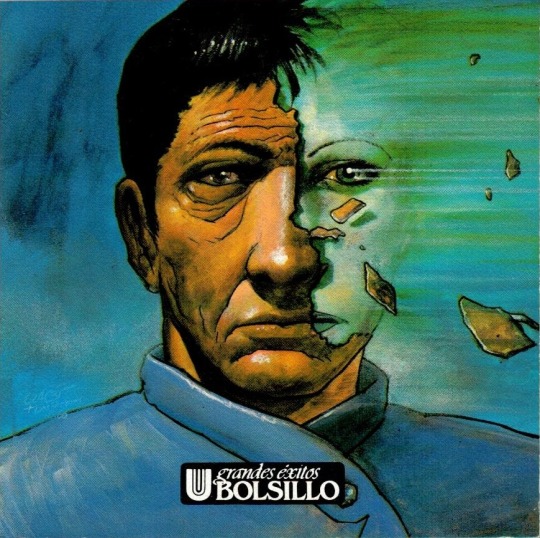
Cover art by Antoni Garcés for a 1987 Spanish edition of The Female Man, by Joanna Russ
285 notes
·
View notes
Text


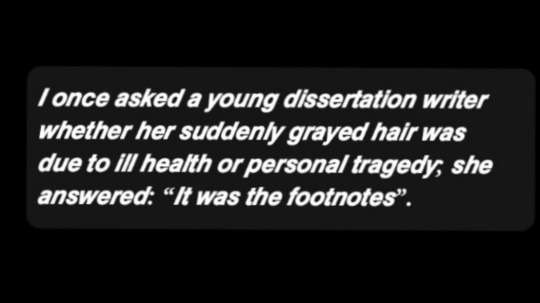

"Footnotes"
Cassandra Clare,The bane chronicles//Taylor swift,tolerate it(folklore)//Joanna Russ, How to Suppress Women's Writing//Zadie Smith, On Beauty
#the 'footnotes' used in literature#yes taylor swift counts#folklore album#taylor swift#the bane chronicles#cassandra clare#joanna russ#tolerate it#on beauty#zadie smith#folklore#how to suppress women's writing#quotes#spilled ink#bookblr#book quotes#song quotes#books & libraries#songs
53 notes
·
View notes
Text

In her utterly superb writing, Joanna Russ discusses all the techniques that have been used to suppress women authors, keep them from the canon, and dismiss their work—from lauding their one exceptional work as separate, unusual, to isolating them from their fellow authors and community, to labeling their choice of topics as immodest or confessional or particular—and much more. How to Suppress Women's Writing is a must-read, superb and now covered in my annotations, highlights, and underlines.
She emphasizes that the solution is not bringing women one by one into an already set canon but by allowing for multiple "centers," multiple ways of writing and of great literature. She also does a good job in an afterword of highlighting her own privilege and describing how her categories can be applied to many different marginalized groups.
(Note: I thought Jessica Crispin's forward was so awful (she does the same thing to women writers that Russ literally describes in this book, describes Russ as an exception who wrote unlike other ’80s/’90s icons, then claiming she's been left out of a literary canon of those women SFF authors, which she has not) that I carefully removed it from my volume of the book.)
Content warnings for sexual assault, misogyny, suicide.
#how to suppress women’s writing#joanna russ#bookworm#bookish love#book review#feminist nonfiction#my book reviews
19 notes
·
View notes
Text

vote YES if you have finished the entire book.
vote NO if you have not finished the entire book.
(faq · submit a book)
4 notes
·
View notes
Text
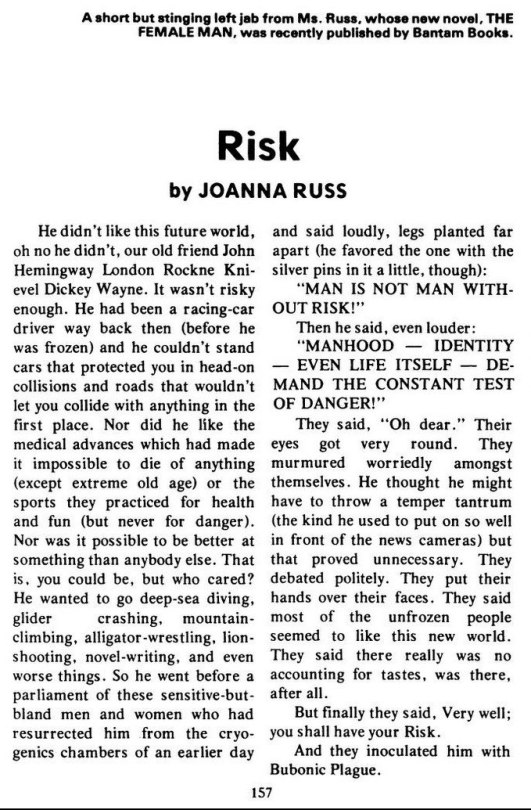
Finally found this short story.
It's been in the back of my mind ever since I heard the Oceangate's CEO saying that safety measures are for pussies :')
17 notes
·
View notes
Text

Vintage Paperback - And Chaos Died by Joanna Russ
Ace (1970)
#Paperback Cover#Paperback Art#And Chaos Died#Joanna Russ#Science Fiction#Vintage#Art#Paperback#Paperbacks#Ace Books#Ace#1970#1970s#70s
13 notes
·
View notes
Text
hello
do you trust me to recommend you some books
I read ~170 this year and here’s reviews of my top ten, written for fb and crossposted under the cut in case you’re interested
1: Camp Concentration by Thomas Disch
-I know it’s not obvious from the way I conduct myself here, but I have a very large vocabulary. I was a kid who read the dictionary and also any thesaurus I had access to. So, that said, consider how much it means to me personally that this book taught me 30-50 new words. This isn’t a huge part of the reason I loved this book, but it is a very impressive fact about it that I think will grab the attention of people who might otherwise not read it. This book changed the way I read, the way I think about literature, and the way I evaluate what I have previously read. It’s offensive to me that I lived 30 years as an avid reader and culture sponge without hearing about this book. I cannot recommend it enough. I give it top spot on this list for a very good reason. I’d like to avoid spoiling any of the plot because while I called the twist easily, discovery of each point was so delightful that I want you to have that same experience.
2: Cockatiel x Chameleon by Bavitz
-You all have plenty of experience with me recommending works of fiction published online in formats that deter most readers. This is a normal Najwa activity. I know how it sounds and I know, therefore, that this plea will go more or less unheard, but I BEG you. Look past the fact this was published on AO3. This is one of the most remarkable books I’ve read, period. I mentioned in my worst of how much it bothers me that most writers can’t plausibly write about the internet. This book is the FUCKING ZENITH of writing about being online. It is the absolute peak and I will be shocked if I ever encounter another work that overtakes it. This is a book about people who are so strange they are barely human, but in ways that will be instantly familiar, intimately true, to those of us who grew up on the internet. There is violence and abuse and love and beauty and Chatroulette. There is art and gore and exploration of identity and apocalypse. There is fucking POSTING.
3: Serious Weakness by Porpentine
-Charity Heartscape Porpentine is one of our greatest living authors, opinions of snide Twitter users notwithstanding. I am an evangelist for her Twine game poetry because it is so singular and so affecting. Even a decade on, I can play through Their Angelical Understanding and feel freshly stabbed in the gut. Imagine the thrill I felt when she posted about her completed novel. I would (strongly) recommend this even to people who (somehow) bounced off her games, because her prose style is very distinct from the voice those are in (yet still recognizable). This is an incredibly violent, sick, stomach-turning, difficult, ugly, terrifying book. It’s also ultimately asking the reader a question about love and compassion. If you are sensitive to any trigger in written word about any violent action one person can do to another, skip this book, but if you feel like you have the strength, give her the nine bucks or whatever that she’s asking and devour it like I did. A hook for you: our protagonist has a chance meeting with an embodiment of pain. What follows includes torture, gender, climate disaster, and Columbine. Gorgeous. This book almost convinced me to start doing video essays so I could explain to people the incredible factors at play in it.
4: Negative Space by BR Yeager
-I have been trying to read this book for free for so long that I broke my streak and paid actual money for it. It was one of the better purchases I made all year. Thanks to finally reading some Stephen King this year I now have the requisite foundation to see how heavily his style inspired Yeager in this book, but I would die on the hill defending my position that Yeager does King better than King ever did. There is evil seeping out between the lines of this book. Have you ever had a nightmare that made you feel doomed the entire next day? Have you ever felt you were trapped in your shitty, dying home town? Have you ever been seduced by the excitement of activities that you know might actually kill you? Have you ever woken up in the middle of the night and looked at your own dark reflection? Go back to the deepest point of your teenage depression here.
5: We Who Are About to by Joanna Russ
-One of the shortest entries on this list and so one of the easiest sells, but it is just as full of meaning as any other that made the cut. There is so much implied and unsaid about this protagonist. She feels whole, like this is the last chunk of chapters in a series centered on her, but she represents something universal. She is one member of a group from a crash-landed spaceship, a group small enough in numbers that there’s no way for humanity to last on this planet more than one more generation. Any attempts to do even that are so plainly cruel and self-deluding that she wants no part of them, but the others with her don’t see it the same way. Her story is womanhood under patriarchy, it is life and death, it is self-determination. Brutal. I read this at the airport and cried in public.
6: Carrie by Stephen King
-As much as I hate to say it, I gotta hand it to Uncle Steve (or really to Tabitha). This book very nearly justifies the rest of his career on its own. I thought had picked up most of it from cultural osmosis, but there was a truly shocking depth that I couldn’t have found without experiencing it firsthand. Maybe it’s funny to use this word here, but this book is humanist and compassionate and sincere in a way that King never finds again, particularly with the women he writes. Carrie is so vivid that I felt a protective instinct for her throughout the book even though I knew she was about to discover her own power. She reflects parts of me about as well as Lindqvist did in Little Star, which is the work of art that is THE most personal to me. A classic for a fucking reason.
7: The Doloriad by Missouri Williams
-This year, lots of the books that I read had strange echoes of each other. In this, I can pick out shades of Carrie, of Camp Concentration, of We Who Are About To, and even of Serious Weakness. Rarely if ever are these references by each author, but it has enriched my experience by having unofficial interlocking intertexts for all of them. This book has been very divisive with reviewers, and I understand why, because it is cruel and the prose is extremely stylistic. This is somewhat experimental and fully literary and sincerely philosophical. I get it. Not for everyone. But it was for me. A clan of inbreds at the end of the world with their eyes on their scapegoat, nonverbal and disabled Dolores. It shocked me and it challenged me and I loved it.
8: The Ice Cream Man and Other Stories by Sam Pink
-These short stories did the exact opposite of the thing that pissed me off about The Florida Project. These are about people who are varying degrees of sympathetic but the same degree of desperately, penny-scrapingly working poor. The easy pull quote is “unflinching,” because it turns an eye on very ugly parts of real life for so many of us. I think people who grew up middle class will find some voyeuristic, prurient pleasure in these stories, but they’re not written for you. They’re written for us, the people who have lived this way.
I Who Have Never Known Men by Jacqueline Harpman 9
-I don’t need to tell you how great this book is, because the whole of booktok has told you this all year. Instead, what I will say is that it is much stranger and less tidy than you’re imagining when you hear the blurb. It’s a short read and it is one of the few times I haven’t regretted following booktok’s advice.
Only Lovers Left Alive by Dave Wallis 10
-This barely squeaked onto this year’s best of, because I started it before 2022 ended and finished it early in the new year. As I read it, especially in the first 20% of the book, I was confused as to how it ended up on my TBR. But toward the end, and throughout the year as I’ve continued to think about it, I understand more instinctively than intellectually that this is a remarkable work. A short synopsis: in the 80s in the UK, there is an epidemic of suicide, but only by adults. The teens left behind forge their own path.
#Porpentine#Bavitz#Thomas Disch#Dave Wallis#Sam pink#Stephen King#jacqueline harpman#Joanna Russ#Missouri Williams#br yeager#b. r. yeager#charity heartscape porpentine
4 notes
·
View notes
Text

Books I Read in 2024
#24 - How to Suppress Women's Writing, by Joanna Russ
Rating: 5/5 stars
The prologue asks the reader not to view the book as a mirror, but it was impossible for me not to, as a woman, as a writer, and as a student of "literature" both formally (I did take courses on it in college) and informally (how many book reviews am I up to now? Last time I counted it was over 800, so by now I might be close to or even over a thousand...)
I looked into that mirror and saw not only the ways I have personally been suppressed, but the ways I have participated in my own suppression and suppressed others.
I've never wanted to write "literature" or be regarded as a "great" writer; when I was scribbling (to borrow from Alcott) away on notebook paper in high school teachers would joke about The Great American Novel, but chasing that laurel was never my goal. I wrote about what interested me, which has ranged from weird absurdist short stories when I was younger, to fantasy and sci-fi, and finally, what I actually published was romance (though some of it in a post-apocalyptic setting, so that's also blending in some sff/horror elements.) I never felt actively pushed out from the "center," as Russ puts it, of the literary canon; I never wanted to be there.
But that was on a conscious level. Subconsciously, I probably knew I couldn't get there even if I wanted to and tried.
So I'm a genre-fiction author. (I'll still call myself that even if it's been over three years since I published and there's no new book on the horizon--literature authors can take decades-long breaks and still come back with another book and they'll have been an author the whole time, so I'll keep my title and my pride.) I'm quite comfortable and at home in the genre suburbs, away from the bright city lights of the literary canon, but I live there knowing full well that no matter how well genre fiction sells, no matter how romance is the biggest single genre in the industry in terms of both published works and total sale, it will still remain the suburbs. There's no real hope in me that genre fiction will ever get the recognition it deserves from the literary elite--but that's how I'm still participating in the system, because if I didn't still, on some level, think literature was "better" then it wouldn't matter, would it?
I live in the genre suburbs based on what I was reading growing up--my mom was an avid reader and it was almost entirely mystery and science fiction, not just the "classic" science fiction that was largely male in her day (Bradbury, Heinlein, Asimov, etc.) but also, with the popularity of the "new" Star Trek series in the late 80s when I was a kid, whole shelves full of Star Trek novels, which in her collection seemed to be roughly balanced in terms of male/female authorship. Almost all of the ones I loved best and reread a dozen or more times were written by women. (I love you, Diane Duane, I didn't even know you'd written non-Trek stuff until years later.)
My role models for writing were not entirely female--it's impossible to deny the impact Stephen King in particular has had on my work--but most of what I read in my late teens and early twenties as well was female-written fantasy, romance, and fantasy-romance. (I refuse to call it romantasy. Absolutely refuse.)
So I don't lack a tradition, one of the forms of dismissal Russ points out is used to isolate female writers as anomalies; their works may be exceptional in quality, but they are still exceptions to the "rule" of male dominance.
What I do lack is an awareness of how deeply I've internalized the male-driven standards of "literature" anyway and wield them as a cudgel in my book reviewing. Yes, I often disdain works of literary fiction knowingly for their hollow pretension and constant insistence that only male experience matters, only men deserve to have their stories told, and everything else is lesser than them. But I had not realized how firmly I had recentered what I believe "good" writing is in my own experiences and my own desires and still looked down on marginalized authors that wrote things too different, too experimental, too unfamiliar, and criticized them in much the same way any of the historical critics Russ quotes would be speaking of my work, were they around still to read it.
It was the section on poetry, I think, that really pushed the mirror in my face and made me cringe at my own actions. Once upon a time, a Tumblr poet made it big with her debut, and I read it a few years later, and I gave it a poor review, contending that no matter how heartfelt it was, it wasn't "poetry." I tried to keep the critique of her work about her work, and not about the obviously powerful emotions and pain that spurred it, and I hope I succeeded; but I definitely used the rubric of "poetry" that I had been taught my whole life as the lens to view her pieces, and they all fell short by that standard, no matter how genuine the emotion was.
I did the exact same thing to her that male critics have been doing to female poets the whole time; she wrote it, but it isn't poetry.
I don't think I would have the experience Russ writes of in her afterword, where she realizes she reads Their Eyes Were Watching God, thinks it's bad, but then realizes she's too far away from it (essentially) and does a bunch of educational reading to bring herself closer to it before she rereads, and hey whaddaya know, it's actually really good. If I reread that slim volume of short poems again...I'll be honest, I'm pretty sure I still wouldn't like it. But I would no longer say it's not poetry. "Growth only happens in the margins," as Russ said repeatedly. All of her observations about the way men dismiss women stand equally true (as she herself says) for any other majority/minority dynamic, and it's the marginalized authors who have the freedom to be different, to push the boundaries and experiment with style and form and content, simply because they are so far away from the calcified center mass of "true" literature that, by unspoken definition, can only be produced by older, white, middle-class or higher men.
2 notes
·
View notes
Text


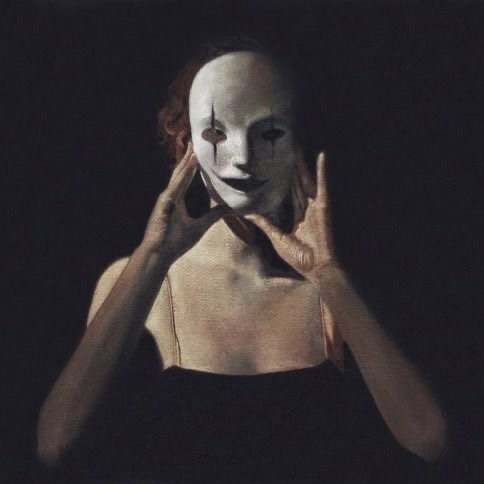

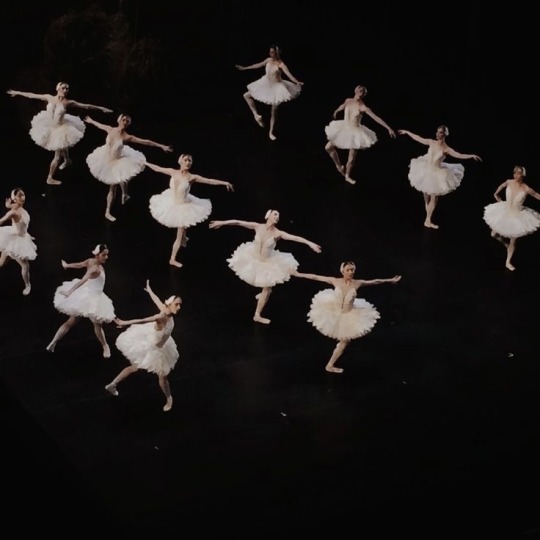



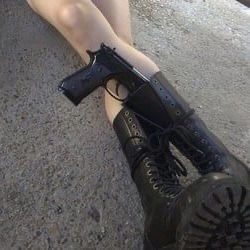

YELENA BELOVA of MARVEL COMICS ↬ you have that wrong, natalia. it is you who will call me black widow.
#yelena belova#black widow#marvel#marvel comics#earth 616#moodboard#tw guns#joanna russ#my little homicidal ace lesbian…#we love you
15 notes
·
View notes
Text
Joanna [Russ] describes writing the novel [The Female Man], and acknowledges the audience in the final chapter. She describes her style of narration as feminine:
“I have no structure… my thoughts seep out shapelessly like menstrual fluid, it is all very female and deep and full of essences, it is very primitive and full of ‘and’s,’ it is called ‘run-on sentences’” (p. 137)
(Wikipedia)
my thoughts seep out shapelessly like menstrual fluid…
#honorable mention to 'it is all very female and deep and full of essences'#dishonorable mention to 'primitive'#joanna russ#not even sure how to tag this tbh#bioessentialism cw#i guess#anyway i sent this to el already but i'm just. still reeling at that menstrual fluid bit so i'm making it everyone's problem
17 notes
·
View notes
Text
To Write Like a Woman: Essays in Feminism and Science Fiction is a collection of essays by Joanna Russ, published in 1995.[1] Many of the essays previously appeared as letters, in anthologies, or in journals such as Science Fiction Studies, Extrapolation, and Chrysalis. Topics range from the work of specific authors to major trends in feminism and science fiction. Through all of these different topics, Russ underlines the importance of celebrating the work of female authors and turning a critical eye on the commentaries and work produced by men.
The collection is split up into two sections. Part One focuses on the critique of masculinist writing and male authorship, while Part Two focuses on the work of female authors and their relationship to writing.

#read this#books and authors#books and writing#books and reading#books and libraries#books and literature#books#women writers#women authors#science fiction#essays#feminist writing#feminist writers#feminist#feminism#joanna russ#writing#cultural criticism#cultural critique#art critique#art criticism#critique
7 notes
·
View notes
Text
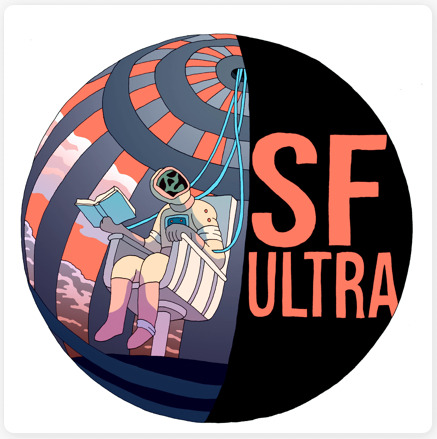
Sean McTiernan's SF podcast (is great) :
SFUltra is a show about a guy who hated science fiction until 2022 convincing himself he actually loves it, one book at a time. It is going pretty well so far. It gets published every two weeks.
Apple Podcasts
Spotify
RSS
.
SFULTRA #10 - Ice - Anna Kavan
special 2 eps: Motorman / The Age Of Sinatra - David Ohle
SFULTRA #9 - We Who Are About To… - Joanna Russ
SFULTRA #8 - I, Vampire - Jody Scott
SFULTRA #7 - Babel-17 - Samuel R Delany
SFULTRA #6 - The Dispossessed - Ursula K Le Guin
SFULTRA #5 - Camp Concentration - Thomas M Disch
SFULTRA #4 - Rogue Moon - Algis Budrys
SFULTRA #3 - Electric Forest - Tanith Lee
SFULTRA #2 - Doloriad - Missouri Williams
SFULTRA #1 - High Rise - JG Ballard
SFULTRA #0 - Why Science Fiction?
Patreon :
Perfect Taste Forever is a recommendation podcast about everything that isn't science fiction. It often features miniseries on a specific topic, such as:
Decoy Octopus - the concept of roleplaying
Fuck You - underrated gay novelists
Murder House Sold - true crime
.
.
His previous shows have included lengthy examinations of horror (Hundreds Of Dead Bodies), thrillers (All Units), found footage horror (Hundreds of Pixelated Dead Bodies), whatever I felt like (The Wonder Of It All and Calling All Units) and even old time radio (Kiss Your Ass Goodbye).
As co-host : Live At The Death Factory (Scum Cinema), Bodega Box Office (rap movies) and Self Pity (self pity).
.
.
All Units feed :
#sf#scifi#science fiction#literature#funny#experimental fiction#books#jg ballard#joanna russ#david ohle#anna kavan#jody scott#samuel r delany#ursula k le guin#thomas m disch#tanith lee#missouri williams#the doloriad#motorman
6 notes
·
View notes